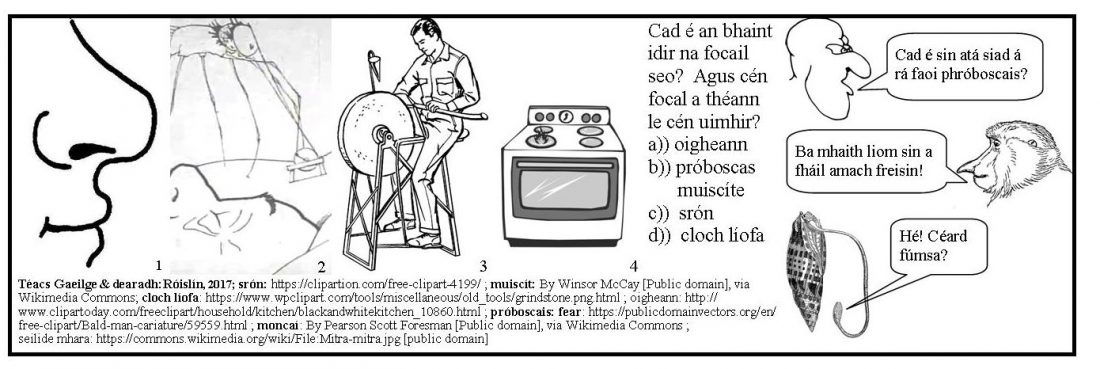Sróna, Próboscais, Clocha Líofa agus Oighinn: The Irish for ‘Noses,’ ‘Proboscises,’ ‘Grindstones,’ and ‘Ovens,’ and Why This Selection! Posted by róislín on Aug 29, 2017 in Irish Language
So what’s the connection between the four Irish terms in the title of this blogpost, most of which were introduced in recent posts (naisc thíos)
Well, first let’s translate the title, and that will make some of it clear.
sróna, noses
próboscais, proboscises. By the way, I did look in several Irish dictionaries for “mouthpart,” haunted always by “The Host” episode of The X-Files. But no luck yet for “mouthpart” i nGaeilge. I imagine it would be “béalpháirt” or “béalchuid,” but would like to see some confirmation.
clocha líofa, grindstones [remember, “ch” as in German “Buch” or Welsh “bach“]
oighinn, ovens [remember the “gh” is basically silent, although it does affect the vowel sound]
The first two have a fairly straightforward connection. If an organism, mar shampla, feithid, has a sort of nose/mouthpart, we might call it a proboscis, if the “nose” and “mouth” are not really separate. Hmm, I guess I never really thought about the issue of whether there have to be polláirí to be considered a nose as opposed to a proboscis. At any rate, if used for humans, “proboscis” is usually either in jest or a downright insult. Jimmy Durante comes to mind, although he used it on himself, in “The Boys with the Proboscis,” his duet with Bob Hope. And Google gives me about 11,900 hits for Cyrano de Bergerac combined with proboscis. At any rate, nose or nosepart or combined nose/mouthpart, the words “srón” and ” próboscas” are reasonably related.
The “grindstone” connection comes from the English idiom, “to keep one’s nose to the grindstone.” As we’ll see momentarily, the traditional Irish phrase is actually quite different — that’s the “oigheann” connection. But the word for grindstone is interesting in Irish, anyway, even if it’s not part of the usual idiom.
Probably many “foghlaimeoirí Gaeilge” first learn the word “líofa” to mean “fluent,” which indeed it does. “Cainteoir líofa,” srl. But it really comes from the verb “líomh” (grind, sharpen, polish by friction.” The verbal noun form is “líomhadh,” and there’s a verbal adjective form “líofa.” So we might say that the Irish for “fluent speaker” (cainteoir líofa) literally means something like “polished speaker.” Not sure about the friction part though – LOL! We can probably discard that here.
Other uses of “líofa” in its more physical sense include:
lann líofa, polished or sharpened blade
tua líofa, a sharpened axe
Finally, we have “oigheann” (oven). This introduces the actual frása traidisiúnta in Irish for “to keep one’s nose to the grindstone.” Like many idioms (cora cainte) and figurative or metaphorical phrases (frásaí fáthchiallacha nó meafaracha), the exact translation (using “srón” and “cloch líofa“) doesn’t really pertain, although these days many expressions are translated back and forth between languages, since most Irish speakers these days are bilingual (dhátheangach), if not trilingual (trítheangach) or more.
So, i nGaeilge tá an frása seo againn:
an taos a choinneáil leis an oigheann, lit. to keep the dough with the oven.
OK, dough, oven, nose, grindstone, whatever.
And just a quick review, with a few blanks to fill in (freagraí thíos), to review these words, listed in basic form, then with definite article in the nominative singular, genitive singular, nominative plural, and genitive plural:
srón, an __srón, na sró__ne, na sróna, na srón
próboscas, an próboscas, an phróbosca__s, na próboscais, na __próboscas
cloch líofa, an c__loch líofa, na clo__che líofa, na clocha líofa, na __cloch líofa
oigheann, an __-oigheann, an oigh__nn, na __oighinn, na __-oigheann
So, sin é don bhlagmhír seo, cúpla focal agus cúpla frása. There are actually a few more ways to suggest “keeping one’s nose to the grindstone.” An chéad bhlagmhír eile? SGF — Róislín
Freagraí:
srón, an _t_srón, na sró_i_ne, na sróna, na srón
próboscas, an próboscas, an phróbosca_i_s, na próboscais, na _b_próboscas
cloch líofa, an c_h_loch líofa, na clo_i_che líofa, na clocha líofa, na _g_cloch líofa
oigheann, an _t_-oigheann, an oigh_i_nn, na _h_oighinn, na _n_-oigheann
Naisc:
Vocabulary Round-up from ‘More Irish Numbers Practice: Orduimhreacha i dTeidil Scannán’ (Cuid/Part 2)Posted by róislín on Aug 26, 2017 in Irish Language
Vocabulary Round-up from ‘More Irish Numbers Practice: Orduimhreacha i dTeidil Scannán’ (Cuid/Part 1) Posted by róislín on Aug 20, 2017 in Irish Language

Build vocabulary, practice pronunciation, and more with Transparent Language Online. Available anytime, anywhere, on any device.





Leave a comment: